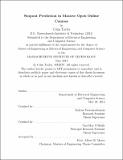Stopout prediction in massive open online courses
Author(s)
Taylor, Colin, S.M. (Colin J.). Massachusetts Institute of Technology
DownloadFull printable version (8.884Mb)
Other Contributors
Massachusetts Institute of Technology. Department of Electrical Engineering and Computer Science.
Advisor
Kalyan Veeramachaneni and Una-May O'Reilly.
Terms of use
Metadata
Show full item recordAbstract
Imagine your favorite college professor standing behind a podium in the center of Michigan Stadium in Ann Arbor, lecturing 109,000 students. Though that sounds like an unlikely scenario, Massive Open Online Courses, MOOCs, have practically made that a reality by offering previously exclusive classes to mass audiences. However, as the barriers to entry for MOOCs are very low, student dropout, referred to as student `stopout' [2], is very high. We believe that studying why students stopout will enable us to more fully understand how students learn in MOOCs. This thesis applies a variety of machine learning algorithms to predict student persistence in MOOCs. We built predictive models by utilizing a framework that went through the following steps: organizing and curating the data, extracting predictive, sophisticated features, and developing a distributed, parallelizable framework. We built models capable of predicting stopout with AUCs¹ of up to 0.95. These models even give an indication of whether students stopout because of predisposed motivations or due to course content. Additionally, we uncovered a number of findings about the factors indicative of stopout. These factors are presented in Chapter 10. Through the prediction framework we hope to help educators understand the factors of persistence in MOOCs and provide insight that prevents stopout. To our knowledge, this is the first in-depth, accurate prediction of stopout in Massive Open Online Courses.
Description
Thesis: M. Eng., Massachusetts Institute of Technology, Department of Electrical Engineering and Computer Science, 2014. This electronic version was submitted by the student author. The certified thesis is available in the Institute Archives and Special Collections. Cataloged from student-submitted PDF version of thesis. Includes bibliographical references (page 121).
Date issued
2014Department
Massachusetts Institute of Technology. Department of Electrical Engineering and Computer SciencePublisher
Massachusetts Institute of Technology
Keywords
Electrical Engineering and Computer Science.